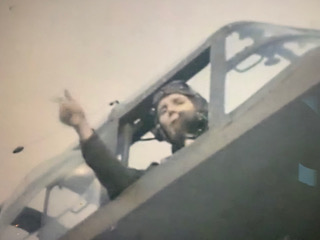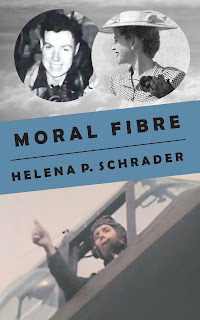Kit Moran, the hero of "Moral Fibre," did not start his flying career in the pilot's seat. He first volunteered, trained and qualified as a flight engineer. Kit flies 36 operations as a flight engineer and only later qualifies as a pilot. When the time comes to crew up, however, his own experience as an engineer gets in his way by making him very fussy. Yet, as if by providence, the right man finds Kit and they become a superb team.
Excerpt 1:
Finding a flight engineer proved more difficult. Too different in background and personality to like the same kind of people, Stu and Terry recommended two different candidates. Kit agreed to fly with both, but he also had his own expectations for the role he’d once held himself. He took it as read that an engineer would make the same calculations in his head as he had done, such as knowing at all times how far they could fly at the current rate of fuel consumption. He also expected his engineer to be able to locate the control cables in the fuselage in the dark, to lower the undercarriage without hydraulics, and a variety of other skills he’d brought to Don’s crew. Neither of the men his sergeants recommended could do these things, and Kit turned them down. It proved to be a mistake.
Flight engineers started avoiding him and teaming up with other pilots. Kit had set his expectations too high and would now be left with the dregs. After two days only three crews were incomplete, one of which was Kit’s. The following day, a burly Scotsman with flight sergeant stripes climbed out of a crew bus beside N-Nan and introduced himself to Kit with a smart salute. “Gordon MacDonald, sir. I’ve been temporarily assigned as your Flight Engineer, sir.”
“How old are you, Flight?” Kit asked, noting the deep lines chiselled into his face. Stu had mentioned this man as one of the remaining candidates but been dismissive based on his age.
“Thirty-five, sir. That’s why most of the lads call me ‘Daddy.’” He grinned as he admitted this.
“How long have you been in the RAF?”
“Twenty years. Joined as one of Trenchard’s brats in ’24.”
“Fitter?”
“Yes, sir.”
“That makes two of us, Daddy. The fitter part, that is. I was never a Halton Apprentice. Welcome aboard.” Except for Adrian, who already knew, the rest of Kit’s crew gaped at their commissioned skipper in astonishment. They had not dreamed Kit had once been a lowly erk.
“Ah, sir?” Daddy MacDonald stopped Kit as he turned to mount the ladder into the aircraft.
“Yes?” Kit waited expectantly.
“The other engineers are saying, like, you expect your engineer to do a lot of maths in his head. Well, I thought I’d better tell you straight up that I can’t do that, but I’ve got a very clever wee pencil here.” He pulled the stub of a pencil from behind his ear. “And a pad of paper here,” he tapped the left breast pocket of his battle dress, “and I’ll do the calculations by hand. They’ll be right that way, skipper.”
“Fair enough,” Kit told him. “Let’s prepare to start engines.”
By the end of that first flight Kit knew Daddy was an asset. The older man was conscientious, meticulous and utterly unflappable. Kit rolled the Lancaster to prove to himself that he could do it, but it was also a private victory roll for getting this far: a Lancaster skipper with a complete crew. He wished Georgina could have been below to see it.
As the dust fell back from the ceiling to the floor Daddy asked in a calm voice, his face utterly impassive, “Do you do that a lot, sir?”
“I don’t plan to do one ever again,” Kit answered honestly.
“In that case, sir, I won’t ask for a transfer after all.”
The rest of the crew burst out laughing, adding their agreement with loud shouts of “hear! hear!”
"Daddy" MacDonald, the Flight Engineer, is the oldest member of the crew at 35. He's worked his way up through the ranks, and he's married with two kids. As Flight Engineer, Daddy, sits nearest to Kit during flight, and assists during take-off and landing. He's calm, trustworthy, and as a former aircraft mechanic, he knows his job inside.
But Kit's reliance on Daddy goes beyond the professional. It is as much outside the cockpit as in it that Kit comes to rely on Daddy. He trust's Daddy's judgement in a way he doesn't that of his teenage gunners and wireless op. He soon learns that Daddy also has a sound intuitive sense of character.
It doesn't take long before Daddy has become the rock on which Kit can rest some of his burden.However, the consequences for them both is not what they expected.
Excerpt 2:
When the English coast came into sight, the tension on board eased noticeably. Nigel suggested to Frank over the intercom that they call over to Kirkby Grange to see if their girls could get away for a drink. Babcock said he had an extra thermos of coffee if anyone wanted it. Moran didn’t have the heart to tell them that they weren’t safe yet. He had to land a Lancaster without rudder control; something that was nearly impossible to do.
They found the Woodhall beacon shortly before seven pm. As Tibble flashed their ID to the control caravan, Moran swung onto the circuit like a man facing the gallows. The Lancaster’s wingspan was 102 feet. The runway was fifty feet wide, and the undercarriage took up more than half of that leaving only a few yards on either side. Too much yaw in either direction could put a wheel off the tarmac. At a landing speed of 90 to 95 mph, they would be lucky to go into a flat spin careening across the grass. Alternatively, they might lose an undercarriage leg and tear along the runway on their belly throwing up sparks likely to ignite the remaining fuel. Or a wingtip could dig into the turf and fling them into a cartwheel.
They received the green light as the flare path lit up in perfect visibility, but Moran lost his nerve. He aborted, calling into Flying Control that he was going around again. He’d been so gripped with visualizing his final moments, he’d forgotten to order the crew to crash positions.
MacDonald cursed colourfully and then announced bluntly, “I cannae hold her much longer, sir! Ye’ve got to put her down!”
“Understood, Engineer, but I want everyone in crash positions first. Did everyone hear that? Crash positions.” A scramble ensued as the others finally realised the danger they were in.
Lining up a second time, Moran called. “Pilot to engineer: we’re going in.”
“Just tell me what rudder ye want.” The tension in MacDonald’s voice was almost painful. He was, Moran judged, nearing the end of his strength.
The wheels brushed the tarmac with a small squeal, and Moran cautiously applied the brakes. They started to veer left. “Right rudder!” MacDonald over-corrected and they started to veer right. “Left rudder!” Like a drunk, they wove from side to side down the length of the runway, Moran wincing at each swerve and expecting the crash to follow. Miraculously it never came. They zig-zagged so much that as their speed fell away, Moran began imagining the commentary he would get in the mess. “Just what did you have in that thermos of yours, Moran?”
His second thought was that he had made it. He had returned alive from a sortie that he’d believed would kill him. His premonition, if it was one, had been wrong.
He slowed the aircraft to a stop before the end of the runway and used the outer engines to swing Zebra onto the taxiway. The ground crew signalled them towards a dispersal point. The Lancaster thudded over the cracks in the concrete toward the torches lighting a hardstanding. Bishop waved his arms in front of his face to indicate Moran could switch off the engines, and one after another the Merlins wound down.
Silence returned — except for the echo of the engines still ringing in his ears — until all at once his crew seemed to come back to life. A garble of excited voices filled the fuselage as they left their crash positions to return to their stations and collect their kit. Babcock’s laughter sounded slightly hysterical, while the expletives peppering Roper and Osgood’s dialogue revealed heightened excitement. Tibble surprisingly, joined in, laughing and chattering unnaturally, a sure indicator of the magnitude of his relief.
Moran looked down in disbelief at his hands still on the control column. He was alive. He was going to see Georgina again. Furtively, he removed one hand to give Zach a pat.
MacDonald staggered to the cockpit, sweat streaking his face. “Well done, Skipper.” His hands trembled with exhaustion, and he flexed his fingers as if to ease stiffness or cramps.
Moran looked up at him and announced bluntly, “I’m putting you in for the DFM.”
MacDonald looked astonished. “Ye’re the one who flew the flaming thing!”
“We wouldn’t be here if you hadn’t jury-rigged that rudder and manhandled it for almost three hours.” That said, Moran released the straps and tried to push himself up out of his seat. He couldn’t. His muscles were too stiff to unfold.
Sounds of some sort of commotion filtered up from the tail. The excited voices of the gunners, exclaiming in wonder and gabbling at a hundred miles an hour, mixed with shouts of amazement from the ground crew. Peal and Tibble tumbled out of their stations to find out what the fuss was about. Torches flashed about in the tail, and with an inarticulate grumble, MacDonald turned around to go and find out what was happening. A moment later, Pete Bishop emerged out of the fuselage into the cockpit. “Do you realise you’ve brought our aircraft back with a man-sized hole and the entire second half perforated like a sieve? If you can’t take better care of her than that, sir, we won’t lend her to you ever again!”
Kit laughed appreciatively.
“Seriously, sir,” Bishop stopped jesting, “I don’t know how your rear gunner survived.”
“Neither do I. The rudder control cables snapped, by the way.”
“Only the rudder cables? You must have a flaming guardian angel!”
"MORAL FIBRE" WON THE HEMINGWAY AWARD 2022 FOR 20TH CENTURY WARTIME FICTION
IT ALSO RECEIVED A MAINCREST MEDIA AWARD FOR MILITARY FICTION AND WAS A FINALIST FOR THE BOOK EXCELLENCE AWARD 2023 IN THE CATEGORY HISTORICAL FICTION. Riding the icy, moonlit sky,they took the war to Hitler.
Their chances of survival were less than fifty percent.
Their average age was 21.
This is the story of just one bomber pilot, his crew and the woman he loved.
It is intended as a tribute to them all.
or Barnes and Noble.



No comments:
Post a Comment